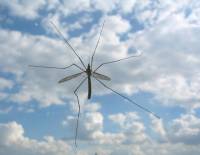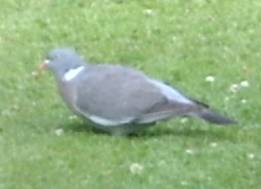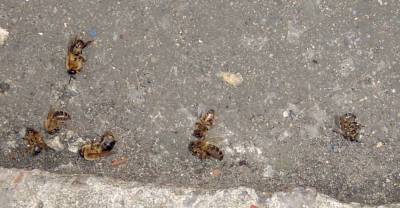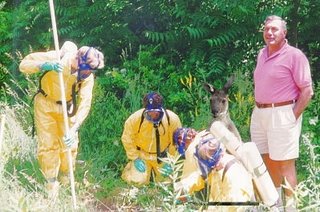Monday, December 18, 2006
Tuesday, December 12, 2006
Little Fatty
I remember our Chinese teacher Zhu Laoshi telling me that I was fat (I think I'd just come back from holiday somewhere), in that straight-talking 'how much do you earn' way that the Chinese do; she was, of course, entirely right.
Saturday, December 09, 2006
The Velvet Underground
Oddly enough, I was searching the web to see if I could get a CD of the bootleg album the velvet underground and so on. I used to have a vinyl version of it, but I threw it out with all my old vinyl records when we put our possessions in storage prior to going to China, it seemed to make sense at the time as I no longer had a record-player and I assumed that I'd be able to get anything on CD. Alas, they don't seem to be selling this on CD.
I particularly liked the tracks It's Alright (The Way That You Live) and Loop; fortunately I have a tape I made of the album (it's up in the loft somewhere - I kept all my tapes), all I need now is a tape player. And then, how do I get it on to a CD to play in my car? Ah, the onward march on technology.
Friday, December 08, 2006
Integration
Wednesday, December 06, 2006
13 things that do not make sense
New Scientist has a list of 13 things that don't make sense, starting with the Placebo effect.
This reminds me of the famous lecture by Lord Kelvin in 1900 where he said there were just two problems left to solve in Physics.
As I recall it, his advice to students was not to go into Physics as Newton's Laws of Motion and the Theory of Thermodynamics had pretty much explained everything - apart from these two minor issues - but I couldn't find any reference specifically giving that advice on the Internet.
The two problems were to do with detecting the ether (the medium through which it was assumed electro-magnetic radiation such as light was propagated) and describing the radiation emitted by a black body.
In seeking the solutions to these, physicists came up with the Theory of Relativity to describe how gravity works and the Laws of Quantum Mechanics to describe how sub-atomic particles (such as electrons) behave. In other words, the whole of modern physics.
Monday, December 04, 2006
Tuesday, November 28, 2006
Pope begins landmark turkey visit
The visit has been overshadowed by anger among many turkeys, enraged by comments the Pontiff made about what to have for dinner on Christmas Day.
A spokesturkey for the political organisation Turkeys Against Christmas said of the Roman Pontiff:
'What have the Romans ever done for us?'
Meanwhile, the Vatican released the following statement:
'His holiness the Pope wholeheartedly condemns the massacres of innocent Muslims, Jews and non-Catholic Christians that were perpetrated during the medieval crusades, but notes that no turkeys were actually killed at the time as they did not reach Europe until after the discovery and conquest of the Americas (for which he also apologises). Sorry.'
Wednesday, November 22, 2006
Blind Van Man
"This van is being driven by a blind man".
Ho, Ho! It was, of course, owned by a company selling blinds. It didn't make me want to buy some blinds (horrible things) just smile in a world-weary, middle-aged sort of way.
Later on, I got stuck behind a long lorry full of concrete blocks which had stopped in the middle lane of a main road in order for the driver to get out and ask directions. Not quite as bad as being in a car reversing in the middle lane of the Hangzhou-Shanghai expressway because the driver's eyesight was so bad that he'd missed the junction.
Monday, November 13, 2006
Death of a Seagull
It reminded me of an incident that occurred when I was at university. I was walking along a footpath in a fairly introspective mood when I saw a ladybird on a leaf (ladybug, if you're North American). It suddenly opened its wing-casings and flew up, right in front of me; at the same time, a robin flew down from the other side of the path and swallowed the ladybird in mid-air.
Friday, November 10, 2006
Shy Bladder, Bashful Bowel
With bowels in spasms convulsive,
But they just couldn't do,
A poo on the loo,
'Cause they found public toilets repulsive.
In today's news, we learn that the UK National Phobics Society is launching a campaign to help the estimated 4 million UK people who suffer from toilet phobia.
Thursday, November 09, 2006
Dumpty Rumpty
Donald Rumsfeld was terribly sure.
But American forces and American men,
Couldn't put Iraq together again.
Wednesday, November 08, 2006
The Middle East Today
To my mind the invasion of Afghanistan was entirely justified given the nature of the Taleban regime and the fact that they were harbouring the main bases of the Al Qaeda terrorists. When I first heard it suggested that the US was considering invading Iraq, I thought that was a completely mad idea as it would not get any support from other Arabic or Muslim countries.
By the time it happened, I assumed that they would not have invaded unless they really knew there was an imminent threat and I certainly wasn't sorry to see a dictator like Saddam Hussain overthrown. The great shame for the West is that it support this bastard in the 1980s when he was at his most lethal: invading Iran, using poison gas against the Iranians and then against the Kurds in Iraq. When countries like France, Germany and Russia - who had all had dealings with Saddam's Iraq - started taking the moral high ground in the run up to the Iraq War, I really did think they were being very two-faced
Since then it has become very clear that the arguments for going to war in Iraq were fatally flawed and the plans fro what to do afterwards were almost non-existant. Personally, I don't believe that Blair or Bush lied; it just doesn't make sense to me that very canny politicians would choose to knowingly lie when it was obvious that these lies would be found out. During the Cold War the US was very susceptible to panics about gaps in particular defensive or offensive technologies that the USSR might have, often based on flawed analysis by the intelligence community egged on by sympathetic political interests and the military/industrial complex. For the US, I think something similar happened here: they got it wrong because they wanted to 'know' certain facts. For the UK, I suspect that it was more likely that we were overawed by the US and the resources it can commit to these things - we simply assumed that they must be right. I don't believe that even someone as dubious as Rumsfeld actively and knowingly lied; to my mind politicians try to evade saying the truth they don't point at a horse and say it's a deer (as the Chinese say).
The way out of Iraq is to do some kind of deal with the various armed groups there, to bring them into the political process - in much the same way as the UK had to deal with the IRA and Israel had to talk to the PLO. The situation is bad and a great many people are being killed, however, I suspect that this would have happened when Saddam died (or was overthrown, either of which were only a few years off) and it is the main reason why George Bush's dad didn't invade Iraq in the first Gulf War
Looking around the rest of the Middle East, it's all a bit of a mess. Key US allies like Egypt and Saudi Arabia are hardly western-style liberal democracies and personally I think we should openly acknowledge the difference between an ally who we hope will reform (e.g. Egypt) and one that is in the process of doing so (e.g. Afghanistan). The Israeli-Palestian problem continues with no end in sight - this, I feel, is another case where we would do well to talk to the opposition (i.e. deal with Hammas), however abhorent their professed views - they have a country (or a territory) to run and ought to make compromises for the sake of their own people and it would do no harm to acknowledge that the Palestian refugees did not volunteer to leave what is now Israel.
Further afield, we can see the US cosying up to various dubious regimes who offer some advantage in the War on Terror. I think this is wrong and it is the same sort of thing that led to us supporting Saddam Hussain in the 80s.
One country that has been beyond the pale for the US for a quarter of a century is Iran which the US regards as part of the axis of evil. I think that there is actually great hope for Iran, it is a democracy - at least in the sense that it has periodic elections and that the vast majority of the population actively exercise their vote. The non-Western aspect of their democracy is that it has a theocracy on top of it that weeds out what it deems to be inappropriate candidates and can over-rule the will of the people. However, I believe that Iran can and will evolve into a true democracy (in the same way that Britain did) as the practicalities of running a successful economy and dealing with material issues become apparent.
Blind Mice
When questioned as to how they can be sure that the mice can now see, the scientists retorted: "See how they run, they all ran after the farmer's wife; before this, they just use to blunder around bumping into things!"
However, doctors announced that they had been unable to reattach the blind mice's severed tails: "If they had been packed in a wet tea-towel with a packet of frozen peas we might have had a chance."
Later, police raided Old MacDonald's farm and a woman was taken into custody; a spokesman said, "We are awaiting the results of forensic tests on a carving knife found at the scene."
Monday, November 06, 2006
Britain AD
Mythology
43 AD. The Romans invade Celtic Britain and build lots of roads, towns and Hadrian's Wall.
410 AD. Barbarians are pressing in on the borders of the Roman Empire; the Romans try to play different groups of barbarians off against each other. Ultimately, the Roman army is withdrawn from Britain. Britain descends into chaos, towns are abandoned, fields revert to forest and Anglo-Saxon invaders raid the coast.
450 AD. Anglo-Saxons warriors, invited in to help defend the country, decide they would like to stay and eventually conquered the whole of what is now England pushing the Romano-British Celtic people into Wales, Cornwall and Brittany.
Archaeology
Britain retained a prosperous rural economy after the Romans left. There's no evidence for massive population decline - except in urban areas where the disappearance of a central tax collecting authority had removed the logic behind having towns in an overwhelmingly rural country. There's no evidence for a whole new population coming in with a different set of traditions, but there is evidence of individual families gradually adopting what we think of as 'early Saxon' culture over several generations. Above all, there's no evidence of large scale displacement of the existing population - either people moving en masse or genocide.
Hmm
It's all a bit puzzling that the traditional story (admittedly from a very narrow base of biased written sources from post-Antiquity) should look so flimsy when compared to the archaeology.
Invasion Theories
It does appear that invasion theories have largely dropped out of fashion. They used to think that different groups of people invaded Britain in successive waves throughout pre-history and that any change in archaeology, e.g. different types of pottery or different ways of disposing of the dead, signified a new population coming in and taking over. Such events would lead to sudden changes in the archaeological record, as each new population came in and did things according to their own traditions. Since the 1960s, archaeologists have pooh-poohed this idea as more and more evidence for incremental cultural changes has been uncovered.
Nowadays, more emphasis is placed on the idea that indigenous populations remain largely in place but there is much more travel (rather than invasion), communication and trade. It's recognised that communities can adopt new practices (particularly if they are beneficial) such as different types of pottery or styles of dress without having had to be invaded - much as renaissance ideas spread to England without the need for any invasion by Italian city states.
Uh?
A question that jumped into my head was 'how come we speak English?' One would have expected the existing (presumably Celtic language) to have survived rather than be replaced by a language related to dialects spoken around the various continental and Scandinavian coasts of the North Sea. Unfortunately, Mr Pryor doesn't analyse this point too deeply as it isn't his area of expertise; although he does make the point that Eastern and Southern Britain were much more closely involved with the continent than had previously been thought.
It is true that language does change and is heavily influenced by the language of those at the top of the social pile; so by the time English displaced French as the language of government in England (200-300 years after the Norman Invasion), it was very different from Old English and massively influenced by French. Perhaps something similar happened in the 200-300 years from the end of Roman rule.
Where does that leave us then?
The image we're left with is of the Romano-British population of post-Roman Britain as living fairly comfortably in a prosperous rural economy, in touch with, and open to, cultural influences from other areas around the North Sea; gradually they became Anglo-Saxonised. It doesn't mean there were no battles; petty kings would have been quite happily slaughtering each other (and, of course, their own close relations); but that's just stuff that happens rather than the mechanism by which the culture changed.
Something similar happened before the Roman invasion, when the rulers of areas in close contact with the Roman world chose to adopt Roman culture. Of course, it's also happening today in countries such as China, where people at all levels of society are adopting and adapting Western culture.
Friday, November 03, 2006
A Journey through the Digestive System
Pregnancy Test
Thursday, November 02, 2006
On the way to work this morning
It occurred to me that if he was from mainland China, this would be a perfectly normal reaction as making eye-contact with the driver is usually taken as meaning that the pedestrian has seen the approaching car and will stop, so the driver will swerve around them or accelerate very fast so they can pass extremely closely and dangerously.
I could be wrong, for all I know he's lived in Liverpool all his life and was hesitating because he'd left his wallet at home; but it did remind me of the difficult and occasionally perilous nature of crossing the road in China.
Later, after I'd parked and was walking to the office, I noticed a shoe in the street. I always wonder what it means when you see a shoe in the street. Has someone dropped their shoe and continued walking without it? Perhaps they were attacked or were drunk? Did someone have a big bag of clothes for charity or for recycling and a shoe dropped out? Was it stolen from outside of a shoe shop? Had the old woman who lived in it been jailed for beating her children and the kids taken into care?
Wednesday, November 01, 2006
I couldn't eat a whole one
Tuesday, October 31, 2006
God-Bothering
(I saw this on James Randi which has a link to the This is True site but it's actually on jumbojoke.)
#10 – You vigorously deny the existence of thousands of gods claimed by other religions, but feel outraged when someone denies the existence of yours.
#9 – You feel insulted and "dehumanized" when scientists say that people evolved from other life forms, but you have no problem with the Biblical claim that humans were created from dirt.
#8 – You laugh at polytheists, but you have no problem believing in a Triune God.
#7 – Your face turns purple when you hear of the "atrocities" attributed to Allah, but you don't even flinch when hearing about how God/Jehovah slaughtered all the male first-born babies of Egypt in "Exodus" and ordered the elimination of entire ethnic groups in "Joshua" – including women, children, and trees.
#6 – You laugh at Hindu beliefs that deify humans, and Greek claims about gods consorting with women, but you have no problem believing that the Holy Spirit impregnated Mary, who then gave birth to a man-god who got killed, came back to life and then ascended into the sky.
#5 – You are willing to spend your life looking for little loopholes in the scientifically established age of the Earth (4.55 billion years), but you find nothing wrong with believing dates recorded by Bronze Age tribesmen sitting in their tents and guessing that Earth is about a couple of generations old.
#4 – You believe that the entire population of this planet with the exception of those who share your beliefs – though excluding those in all rival sects – will spend Eternity in an infinite Hell of Suffering, and yet you consider your religion the most "tolerant" and "loving."
#3 – While modern science, history, geology, biology, and physics have failed to convince you otherwise, some idiot rolling around on the floor “speaking in tongues" may be all the evidence you need to "prove" your choice of religions to be the correct one.
#2 – You define .01% as a "high success rate" when it comes to answered prayers, and consider that to be evidence that prayer works. And you think that the remaining 99.99% failure was simply the will of God.
#1 – You actually know a lot less than many atheists and agnostics do about the Bible, Christianity, and church history – but you still call yourself a Christian.
Friday, October 13, 2006
How to tell if you are dreaming
The nearest I came to this was when I was dreaming a few nights ago. I can't remember much about the dream other than that I had a large map with me; remembering the tip about trying to read, I began to look at it. I can remember distinctly that the words were in different fonts and sizes next to little dots, squares and circles - just like you have on a map to show the difference between hamlets, villages, towns, cities and counties - but all the place names were interrogative words like Where, Which, When, Who, etc. It was at that point that I became fairly sure that I was dreaming.
Wednesday, October 11, 2006
What are eyebrows for?
It started off as an electrical storm in the dark before dawn, which slowly made its way over our house. At one point there was a flash and an almost instantaneous crack of thunder, which scared the willies out of everyone. Later when I tried to log on to our laptop, that I realised that it was running on battery power rather than via the adapter; it would appear that there had been some kind of electrical surge which blew the fuse in the plug - leastways, I hope so, as I'd rather buy a new fuse than a new adapter.
So at lunch time, I walked into the centre of Liverpool to buy a fuse thinking the rain had abated; alas, I was wrong and returned very wet. As I came into the building I realised that my eyebrows were holding a considerable amount of water - Ah! so that's what eyebrows are for!
Friday, October 06, 2006
Straw Veils
James Randi
However, I was even more amazed when I logged on to his website and found he'd printed my email (Chess Brouhaha) - perhaps there wasn't much news to cover this week.
Monday, October 02, 2006
JP
When I was coming to the end of my sojourn in China, early last year, I had to remain in China for a few months after my wife and kids had returned to the UK; I was very fortunate to be sharing an apartment with JP immediately after they had gone. This gregarious and lovable chap helped me to switch into work hard/play hard mode rather than just moping around lamenting my fate (although I got to do that as well as there are so many hours in the day). The limited role I've played in propagating information to JP's colleagues has allowed me to feel I was part of his support network in some small way.
After all the ludicrous, madcap and nerve-racking things that have happened to us all whilst in China, after all the drunken exploits, near-misses in taxis and white-knuckle rides to the airport, and especially after all the improvements to road safety (new traffic lights, pedestrian crossings, making people wear seat-belts, etc.), it seems so bizarre that JP could have suffered such an accident right outside the office. It couldn't have happened to a nicer person.
Tuesday, September 26, 2006
Fish-ibians
It makes a point that I had never properly appreciated before:
"These first amphibians, while classified as amphibians, are quite different from modern frogs and salamanders we see today. These first amphibians evolved from primitive fishes, which are also unlike any fish we have today. "
As someone who often tries to explain basic scientific principles to a 5 year old, it means that the simplistic stories I've told about evolution, e.g. "fish evolved into amphibians which evolved into reptiles which evolved into mammals", are not quite true.
The article has a diagram that makes it a bit clearer:
This reminds me of the following image, one that always brings home the interconnectedness of living creatures. Imagine holding your mother's hand and her holding her mother's hand and so on in an imaginary line threading through the past, then imagine the same but for some other person, eventually the lines join at a common ancestor and the length of the combined line is a measure of how closely related you are. If it were your cousin then the lines would join quite quickly: e.g. you, your mum, your grandmother, your aunt, your cousin. If it were someone else then the connection might be several generations back.
Keeping this image in your head, think what it means in terms of the proposition that people and chimpanzees share a common ancestor. You've got yourself at one end of the line and a chimpanzee at the other; in between there are hundreds of thousands of generations of people, hominids and primate ancestors until you hit your common ancestor 5-7 million years ago. Presumably there are long stretches of the line where everyone looks pretty much the same, and other parts where slight changes can be seen between different parts of the line, and every so often there will be very sudden changes.
If you imagine it with a modern fish at one end, then the line becomes much, much longer partly because the join is so far back in time, but also because the time between generations gets shorter as you go back through primitive mammals, reptiles and amphibians. Ultimately you get to your common ancestor, some ancient fish, possibly called Harold, who is both your n-great grandmother and the fish's x-great grandmother where n and x are very large.
Wednesday, September 20, 2006
Daddy Long-Legs
This bloke's exciting blog was going on about them this time last year.
Tuesday, September 19, 2006
Terracotta Warrior Stunt
Night Frost
Friday, September 15, 2006
A Touch of Frost
I don't read many crime novels, the only other ones I can recall reading are the Mma Ramotswe series - funnily enough I started reading both sets of books when I relocated to China in 2003. As I recall I would have read anything, as we had no English-language TV and hardly any DVDs.
One of the books I found in the loft was a collection of stories by Stanislaw Lem, including one called 'Return from the Stars', in which the hero returns from a 127 journey into space (that was only 10 years for him due to time dilation.
The first part of the story is fairly bewildering - and deliberately so -as Lem describes the hero's bafflement at how different the world is and his consequent culture shock: e.g. he rejects the option of rehabilitation at a special facility on the Moon and opts to go straight back to the Earth, on the spaceship that takes him there he struggles to control his seat as it tries to mould itself to his body; he gets hopelessly lost on the transport system because he doesn't understand what any of the signs mean or how anything works; he goes to a hotel but can't work find the bed, so he sleeps on the floor, furniture morphs out of the walls when required but he doesn't know how to work it.
One of the most poignant bits is where he meets a very old man (134), who he remembers having met as the young son of one of his colleagues; they talk briefly about some of the people they both knew but in the end they have nothing to say to each other. It reminds me of when I was a student and meeting people who I'd known at school but who hadn't gone to University, at the time it felt like they had grown old while I had stayed young, they lived in the grown-up world of work and families whereas I was in the student world of beer and mates
What I liked about this story was the way the future is utterly bewildering and people's values and attitudes have changed, in the way that the modern world would be incomprehensible to a medieval person, not just technologically but socially, they wouldn't understand cars and mobile phones but neither would they comprehend your job nor your relationship to your boss.
The past is a foreign country; they do things differently there. Which is also true of the future.
Thursday, September 14, 2006
Slavery
The first was White Gold by Giles Milton, in which he describes the experience of an Englishman, Thomas Pellow, abducted by North African pirates in 1715 and sold as a slave in Morocco, and also the larger story of how around a million Europeans and Americans were captured and sold into slavery in North Africa in the 250 years or so up to the start of the 19th Century (when the British sailed into Algiers, issued an ultimatum demanding an end to slavery and then blew the place to bits).
The second was Rough Crossings by Simon Schama, which is specifically about the American Revolution and the offer made by the British that any slave that made it to British lines and fought for the British would get their freedom - and what happened to them after that. One of the fascinating bits is about how, before the American Revolution began, there was already an anti-slavery movement in England and a number of court cases had effectively ruled that ownership of slaves could not be enforced in England because slavery was not recognised in Common Law, this was widely believed to mean that slavery was illegal.
As you'd expect the Blacks who fought for the British was despised by the slave-owning American 'patriots', quite a few of them were owned by signatories of the American Declaration of Independence ('all men are created equal') and by George Washington. After the war, they were relocated to Nova Scotia and New Brunswick in Canada, where they were fairly abominably treated - especially by the slave-owning Empire loyalists (Americans who were against the rebellion and chose to go to Canada). In the end, many of them were relocated voluntarily to Sierra Leone, where they were repeatedly let down and badly treated but did eventually find a measure of freedom.
The book ends with the anti-slavery movement growing in strength on both sides of the Atlantic until the British banned the trade, then (some years later) freed the slaves (compensation went to their former owners rather than the slaves themselves) and then actively closed down the slave trade of other countries - which is where it ties in to the end of the other book. Sadly, slaves in the southern states of America had to wait another generation before they were freed.
Which all goes to show what a perculiar muddle history is; progressive concepts that we take for granted now, such as democracy, the rule of law, personal liberty, freedom of speech and other basic human rights, were once just tentative ideas competing against other, completely regressive, ideas - and in some countries they still are.
Is freedom something that would just have happened of necessity as human society got larger and more complex (particulary the devlopment of capitalism) - or is it a specific legacy of a combination of historical events and traditions (Athenian democracy, Roman law, Christianity, English Common Law, Magna Carta, the English Civil War, the American Revolution, the French Revolution...) Personally I think it's the former, freedom develops when people are sufficiently well-off to have choices and that's the only way to successfully run highly developed countries.
Tuesday, September 12, 2006
Chinese
In Mandarin, each character is one syllable e.g. 西 (meaning west) is Xi (pronounced like she in English). If I remember correctly, the locals of Hangzhou pronounce this Si (like see in English), and, if I understand the MDBG Chinese Dictionary correctly, in Cantonese they say Sai.
So the problem I was puzzling over, is how they pronounce foreign names rendered into Chinese characters. Liverpool is rendered as 利物浦 which is pronounced Li Wu Pu in Mandarin, but the same characters appear to be pronounced Lei Mat Pou in Cantonese. Andrew is 安德鲁 which is An De Lu in Mandarin, but that would be pronounced On Dak Lou in Cantonese.
Theoretically, the Cantonese-speakers of Hong Kong could have a different way of rendering Liverpool and Andrew so that they sound better in their dialect, but then you would have different forms of the words and Mandarin-speakers wouldn't recognise them.
I suppose the problem is similar to what happens if different users of the Roman alphabet try to pronounce the same combination of letters e.g. Europa is pronounced very differently in French, English, Spanish and German.
Not sure where I'm going with this - how did they end up with such a bizarre system anyway?
Friday, September 08, 2006
late guinea pig
On nice days, we leave them out all day and by the time I put them away there's a rectangle of very short grass where the run sits on the lawn, with little piles of guinea pig droppings spread about it. Unfortunately, at the end of this particular day, the little blighter was stretched out on his side mouth and eyes open, stiff and cold.
We wrapped him in a tea towel and tried to close his eyes, but they wouldn't shut. Then I dug a fairly deep hole and buried him. The kids took it in their stride to begin with but then seemed to feel guilty about it later. The other guinea pig, N, who was always the more active one, seems happy enough, but then he gets all the hutch to himself now.
Wednesday, September 06, 2006
Flash Games
Tuesday, September 05, 2006
a light for the blind
Of course, I only learned the 'get off' meaning of the word 'alight' when our French teacher at school used it to define the word 'descendre' in a lesson about travel vocabulary. Funnily enough we also learnt about English grammar in French lessons, whereas English lessons consisted of struggling through Shakespeare (is this a dagger I see before me?) and dreary First World War poetry (dolce et decorum est).
Road-Crossing Chimps
When I first saw the link I thought it meant that they had learnt to look both ways and only cross when there was no traffic coming, but actually it just describes how troops of chimps cross the road by having the larger dominant male chimps stationed at the front and back of the troop to protect the females and children in the middle.
This reminds me of the technique I developed when I first went to China, I would position myself so that our larger dominant male was in between myself and the oncoming traffic. I assume that it was his greater visibility to even the most long-sighted of Chinese drivers that meant that we never discovered precisely how much of an impact he could absorb.
My Dad visited Baghdad in the 1970s as part of his job; apart from the fact that the soldiers used to walk around holding hands, he noted that male Iraqis would have their wives walk a little way in front of them just in case there were any landmines; that would appear to be the opposite of the chimps' technique.
Thursday, August 31, 2006
baggage irregularity
While we were waiting to take off, armed police came on to the plane and took two men off. We were on the right-hand side of the plane and they were on the other side in the row behind. Then two security ladies with rubber gloves on, came and searched their seats and the overhead lockers above. The pilot announced that two passengers and their luggage had been taken off the plane due to a 'baggage irregularity'. The Geordie gentleman behind me said that he'd noticed one of them looking at his watch over and over again, and had noticed that the other one was reading the inflight magazine upside-down (I think he meant that the magazine was upside-down not the man).
Then a large family group a few rows further down stood up and were talking to the cabin crew for a long time, before taking all their hand baggage and moving down the plane. The pilot then announced that there had been lightning around the airport and we weren't allowed to move and the ramp connecting us to the terminal had been locked for safety reasons (tropical storm Ernesto was just passing by at this time); after the weather-related incident was over, it seemed that the large family group disembarked and their luggage was taken off. I assume they were scared. Next - and seemingly prompted by concerned from passengers - the security ladies returned and searched all the seats that the family had vacated and all the nearby overhead lockers.
The pilot then announced that because we had been delayed we needed a new flight schedule and that this had to come from Bangkok but was delayed due to a technical glitch, I assumed at the time that this was some reference to outsourcing but I'm not sure what it means now. When we landed in Manchester it was raining just as hard as it had been under Tropical Storm Ernesto in Orlando, but then it does rain a lot in Manchester.
I couldn't find anything on the Internet about it, so I assume that the two men were just guilty of looking a bit swarthy, checking the time slightly too often and having irregular luggage. Fortunately my watch had stopped, which prevented me from looking suspicious; also, our luggage was in the form of regular cuboids.
Friday, August 11, 2006
Pareidolia
So looking at the Nun Bun and seeing Mother Theresa is an example of pareidolia.
The Pittsburgh Ghost Hunter's site has a warning for ghost-hunters about pareidolia; although they seem to have ignored their own advice when it came to the Curtain Face image - in fact check out the rest of their gallery for some very unspooky pictures - ooh, is that a ghostly orb or just a fleck of dust on the lens or in the air?
Wednesday, August 09, 2006
Death Clock
Looks like I'm going to snuff it just before Christmas 2040. So the question would be: do I save money by not buying presents and so increase the value of the estate that I leave behind or do I buy them anyway so they can be received from beyond the grave?
Tuesday, August 08, 2006
Public Speaking
TIPS FOR PUBLIC SPEAKING
- Breathe slowly and deeply
- Warm up by pulling faces, yawning, eating pretend toffee
- Slow down first six words - that helps set smooth rhythm
- Emphasise key words
- Focus on individual faces in audience, making eye contact
- Cast yourself in role of storyteller
So now you know.
Odds
In the article they puzzled over why people persist in betting on outside chances, but seemed to miss the obvious answer that people would prefer to risk a small amount on the chance of a big win (e.g. 100/1 odds) than to risk a bigger amount on the better odds of a much smaller win (e.g. 2/1 on).
I thought that this item on the BBC News about people being encouraged to recycle by the offer of prizes was the same sort of thing; however unlikely the win, it provides motivation for the small effort involved which the marginal benefits of an individual act of recycling do not.
There are always mundane tasks to be done in a job, e.g. filling in timesheets so client's can be billed, and the usual way of handling these things is to send out entreaties urging staff to do the right thing or reprimands telling them off for not doing it. Would it not be more motivational for employers to offer entry into a prize draw for those staff who make the effort?
Thursday, August 03, 2006
Lukira
Squares
... and don't miss the Farting Belgian Pig
Monday, July 24, 2006
Total Perspective
Officionados of the Hitch-Hiker's Guide to the Galaxy will remember the Total Perspective Vortex which shows its victim the entire unimaginable infinity of the universe with a very tiny marker that says "You Are Here" which points to a microscopic dot on a microscopic dot.
Let's get things into perspective by considering the ratio 1:1,000,000:
- an average adult (1.7m) is about a million times bigger than a large bacterium (upto 2 microns);
- a 5-storey building (17m) is about a million times bigger than the width of the finest human hair (17 microns);
- the height of Big Ben or the length of a football pitch (about 100m) is a million times the thickness of paper (0.1mm);
- 2km is a million times wider than a grain of rice (2mm).
If I were as tall:
... as Mount Everest (8848m), then an adult would be as tall as the thickness of 3 pieces of paper;
... as the Earth is wide (12,756km), then Mount Everest would be smaller than a grain of rice;
... as the distance from the Earth to the Sun (150 million km), then the Earth would be a little bigger than the thickness of paper;
... as the distance from the Sun to the nearest star (4.22 light years), then the distance from the Earth to the Sun would be about the size of 3 large bacteria side by side;
... as the Galaxy is wide (100,000 light years), then the distance from the Sun to the nearest star would be less than the thickness of a piece of paper;
... as the Universe is wide (20 billion light years) then, the Galaxy would be half the thickness of the thinnest human hair.
[See Orders of Magnitude and Physics Factbook]
Sunday, July 23, 2006
Uranus
Neptune would be at your knees, Saturn at your nipples, Jupiter on your chin and Mars at the level of your eyebrows; the Earth would be in the middle of your forehead. Of course, on that scale the Sun would be smaller than a grain of rice (about 1/5th of the width) and the Earth would be much smaller than the width of a human hair.
Friday, July 21, 2006
Earth
"The Earth was created by God 10,000 years ago and its largest natural satellite, the Moon, was orbiting it shortly thereafter, around 10,000 years ago."
Which just goes to show that you can't rely on it as a authoritative source of information. Some people believe in a god who you could only describe as a trickster (or perhaps a joker), knocking together a planet just a few thousand years ago but making it look billions of years old; how we laughed.
You can get an idea of the relative sizes of the Earth and Moon quite easily: hold your arm out so the shoulder to the elbow is horizontal and the elbow to fingers is vertical. If you were as tall as the Earth is wide then the Moon would be as wide as from your elbow to the tip of your longest finger.
Now you just need to make your upper arm ten times longer and you'll have got the relative distance, although it would then be quite hard to pick up a cup of tea.
Wednesday, July 19, 2006
Umbrella
Monday, July 17, 2006
Rumpology
Whilst rumpology looks like a case of the extremely gullible being parted from their money, this BBC news item about Malaria is more tragic: people have been taking homeopathic remedies instead of anti-malarial drugs whilst travelling and consequently catching malaria.
The basic idea behind Homeopathy is that, if someone is ill, you should find a substance that produces similar symptoms and then dilute it so much that none of the original substance is left - and that's your medicine. In other words it is utterly stupid.
Real medicine can be shown to work by placebo-controlled double-blind testing - patients are given either the medicine or a placebo (e.g. chalk) but neither the patient nor the doctor knows which as it is randomly determined by someone else - this gets rid of the many effects that obscure whether or not the medicine works especially the placebo effect but also confirmation bias (giving greater weight to evidence that supports your belief than contrary evidence).
As with so many alternative medicines, its adherents claim that homeopathy can't be tested in this way (see last quote in this BBC item); in other words its effects are so subtle that they can't be seen. You'll note that other medicines that actually work, such as Asprin or the anti-malarial drug Lariam, can be tested in this way - and that this methodology also allows us to look for side-effects attributable to the drugs.
Wednesday, July 12, 2006
Tuesday, July 11, 2006
What's that Bird?
For comparison the moulded plastic garden chair you can see is the normal size for fitting a comfortable western bottom:
...and here's a close up:
Drain of Wasps
Monday, July 10, 2006
And Yet More Wasps
It was at this point that the dishwasher repairmen arrived, they were going "oh, it's a Bosch" and telling me that it wasn't worth fixing (they didn't charge me anything, so that's alright) - don't get one with a digital display the steam corrodes the solder connections, apparently.
Meanwhile, the squirty man squirted more stuff up the drain pipe and then down the pipe (see picture). This lead to thousands of wasps tumbling out of the bottom of the pipe and the drain is now heaving with them.
More Wasps
When I went outside to look at the nest, I saw two wasps flying together with one on top of the other and I thought "oh no, their mating!"; then the uppermost one dropped the other one on my head - so I guess those wasps that are still alive are removing the bodies of their fallen comrades. I await the return of the wasp-finder general.
Sunday, July 09, 2006
Wasps
So we called in a pest control company to get rid of it. This consisted of a very talkative old fellow squiting poison into the nest from inside our loft. Apparently the poison they use is in tiny balls that are coated in a substance that humans can't break down but that the pheromones of wasps do break down; it then gets into the wasp through glands at the back of its head which the wasp rubs continually to make sure it has the right smell to be accepted into the nest.
We stood in the driveway chatting as the wasps spiralled down out of the sky; then we noticed a tremendous buzzing noise coming from nearby and realised that the wasps were coming out of their nest and then falling immediately down the drain pipe and collecting in big heap of dying wasps.
The man said that there would have been something like 18,000 wasps in the nest and that they look for food more than 2 hours flight away, so it would take a couple of hours or more for them all to come back to the nest and be poisoned. He said that a nest doubles in size every 7 days and it used to be very unusual to get such big nests before the end of summer (September), but the weather is so mad nowadays that the season for wasps is starting earlier and lasting longer. He showed me a ping-pong ball sized nest in the loft in which he said the queen had hibernated during the winter.
Friday, June 30, 2006
Ants use an internal pedometer
 Ants, apparently, count the number of strides it takes them to get to places. Investigators established this by altering the length of the ants' legs (see picture). See link.
Ants, apparently, count the number of strides it takes them to get to places. Investigators established this by altering the length of the ants' legs (see picture). See link.
Dilbert
Wally: Our CEO got a $400,000,000 bonus this year, Can I get that too?
Boss: Wally, he got that much because he's a million times more important than you.
Wally: Fair enough. Can I have the $400 that you say I'm worth?
Wednesday, June 28, 2006
The eyes have it
People using a canteen "honesty box", when buying a drink, put nearly three times as much in, when a poster of a pair of eyes was put above the box, as when the poster showed flowers.
Tuesday, June 27, 2006
less cat
Smoking in 1957
Tobacco Industry:
"tobacco firms have rejected the findings saying they are merely a 'matter of opinion'. "
Government:
"Parliamentary Secretary to the Ministry of Health said: "The government feels that it is right to ensure that this latest authoritative opinion is brought effectively to public notice, so that everyone may know the risks involved." But he made it clear that people, armed with the facts, would be able to make up their own minds and smoking would not be banned. The prohibition of smoking in theatres, cinemas and public transport is not on the agenda, he added. "
Man in the Street:
"Another man said he was "not frightened at all" by the findings and may even consider increasing the number of cigarettes he smokes each day. "
and my favourite:
Monday, June 26, 2006
smoking fine
Tuesday, June 20, 2006
Monday, June 19, 2006
Cat
Thursday, June 15, 2006
Mummies
The very well preserved body was discovered during the Cultural Revolution in Changsha. It had been wrapped in 20 layers of silk and then sealed in multiple coffins, buried at the bottom of a very cold pit surrounded with charcoal and clay and then covered by a big mound of earth. It was assumed that decay was halted by a combination of the coldness and the fact that no air could get to the body (so the micro-organisms responsible for decomposition couldn't breathe); there was a whole bit about water getting into the coffin by osmosis and what effect this had, but I didn't really follow it.
The internal organs were intact, she had undigested melon seeds in her stomach and she had gallstones; they speculated that towards the end of her final meal a gallstone had obstructed the entrance to the bowel and her already weak heart gave up. They made a big fuss about this as heart-disease has been seen as very much a disease of fat modern western folk.
They also showed them dissecting body of a man from the same period and pulling out all the tapeworms from his intestines.
Whilst looking on the internet for more information I found this site dedicated to mummies, which is mildly diverting but didn't have anything about the Chinese mummy. There is a China Daily article which appears to be about a different film on the same subject but which has a nice picture; they refer to her as Lady Dai.
Tuesday, June 13, 2006
Infrasound
Several years earlier, Tandy was working late in the "haunted" Warwick laboratory when he saw a gray thing coming for him. "I felt the hairs rise on the back of my neck," he said. "It seemed to be between me and the door, so the only thing I could do was turn and face it."
the cause:
The explanation, he discovered, was that infrasound was coming from an extractor fan.
and the reason:
When he measured the infrasound in the laboratory, the showing was 18.98 hertz--the exact frequency at which a human eyeball starts resonating. The sound waves made his eyeballs resonate and produced an optical illusion: He saw a figure that didn't exist.
There is a link to a story in the Guardian about a haunted cellar where the source of the infrasound seems to be a newly built corridor to the cellar, where something is resonating at the right frequency to spook tourists going into the cellar. Wouldn't that be a great thing to add into a haunted house 'ride' in a theme park or fun fair?
Also, right at the bottom it says:
Elephants have the ability to emit infrasound that can be detected at a distance of 2 km.
Sentence Inflation
I've always found it unlikely that people who commit serious crimes really think beforehand about the downside of being caught, especially if they are psychopathic; but once they have committed the crime and the police are after them, they must start thinking about it then, which is when the marginal cost to them of committing further crimes becomes important.
It surprises me when the police express support for the death penalty, if you've killed someone and the penalty is death then you have nothing to lose by killing loads of other people - which would mean the police coming after you and any innocent people who get in your way.
Monday, June 12, 2006
Skippy
Here's a strange picture that I found on this site, where they make fun of it by saying:
"Looks like a poison or gas leak, pity this Australian didn't have any protective gear"
On closer examination you can see that there's a kangaroo in the picture. Hey! Isn't that Skippy the Bush Kangaroo? Did he find the buried packages of ricin and then run off to tell the park ranger?
Friday, June 09, 2006
Aliens
We can assume that, if we ever make contact with intelligent aliens, they may well be similar to us in many ways - such as needing oxygen, being constructed from carbon-based molecules, drinking water and being land animals - as there are probably sound physical and chemical reasons for life working like that e.g. oxygen combines so readily with other elements; there are so many carbon-based molecules; the anomalous contraction of water favours life; animals in the sea evolve stream-lined bodies so don't develop limbs with which to manipulate their environment.
But physical things are bound to be different: gravity, air pressure, humidity, temperature, and the combination of gases in their atmosphere; we could imagine an alien struggling to stand up in our gravity or having its head ballooning because atmospheric pressure is too low. Rather than looking suspiciously like a man in a costume, it would probably be of completely different proportions, taller, wider, shorter, thinner - in the same way that other animals on Earth look very different to people - so you're unlikely to be able to look them in the eye without peering up or stooping down (their eyes, if they have them, would be picking up a different range of the electromagnetic spectrum - would it even overlap?).
It seems unlikely that the sounds uttered by aliens would be anything like the sounds we make in speech, anymore than dogs and cats sound the same; the sounds they utter may not even be within our hearing range. So it's unlikely that we would hear them say 'ET' in however croaky a voice.
If an alien turned up on Earth, walking around, shaking hands, hanging out in bars, etc. the scariest risk to both humans and aliens would be their lack of immunity to terrestrial bacteria or viruses and our lack of immunity to alien germs; as H G Wells realised in War of the Worlds over a hundred years ago. New diseases have caused devestation in human population e.g. the Black Death in Europe or smallpox for native societies in the Americas, Pacific and Australasia.
Forgetting about aliens; if humans ever colonised planets around distant stars, however close to the speed of light we could travel to get there, centuries would still elapse for the people back home, essentially making these colonies isolated communities with their own patterns of disease and immunity. A visitor from mother Earth to such a colony could well wreak as much havoc as European explorers did after Columbus.
If you bothered to read on to this bit then well-done; I stopped reading it myself after the second paragraph.
Da Vinci Code
"I don't know the reason. We just do what we are told to do."
Wednesday, June 07, 2006
The Beast
I hadn't realised that people were making a fuss about yesterday being 6th of the 6th of the 6th (has this all been whipped up by the release of the new Omen film) but it's just occurred to me that the current two-part Doctor Who story (The Impossible Planet last Saturday, The Satan Pit this Saturday) is full of references to the Beast.
I can remember looking up Revelations in the Bible when the first Omen films were shown on TV; and being concerned that the scar under my hair could just possibly be the number 666 - although, oddly enough, on closer examination it looks just like a small line.
Of course, is there be any significance in the following?
crounching + tiger + ambling + sheep = 666























